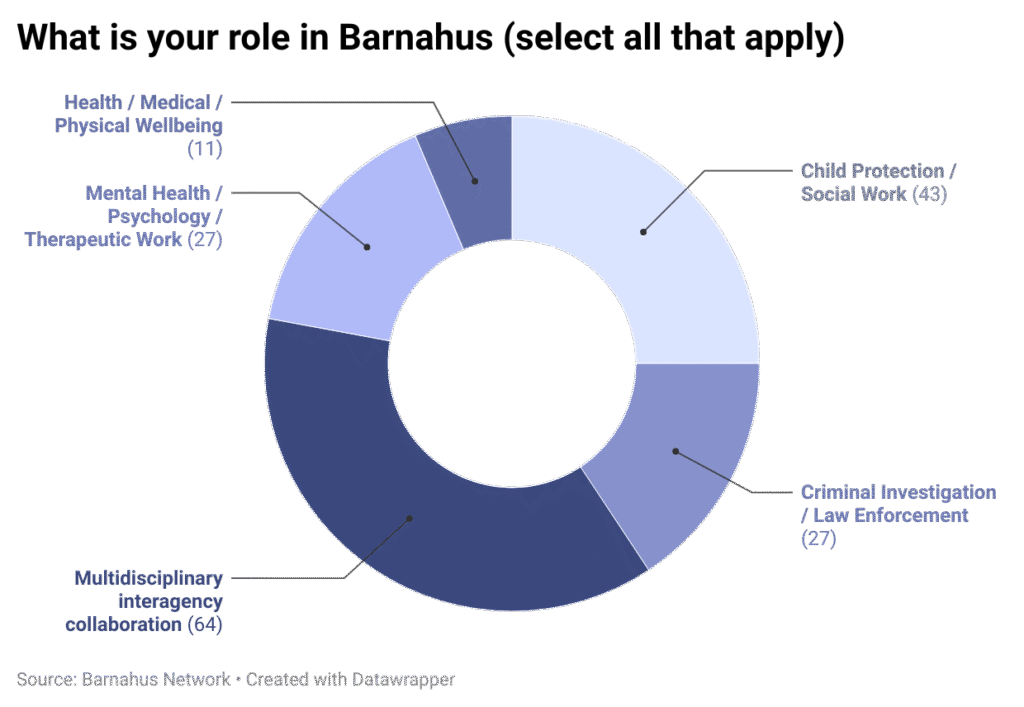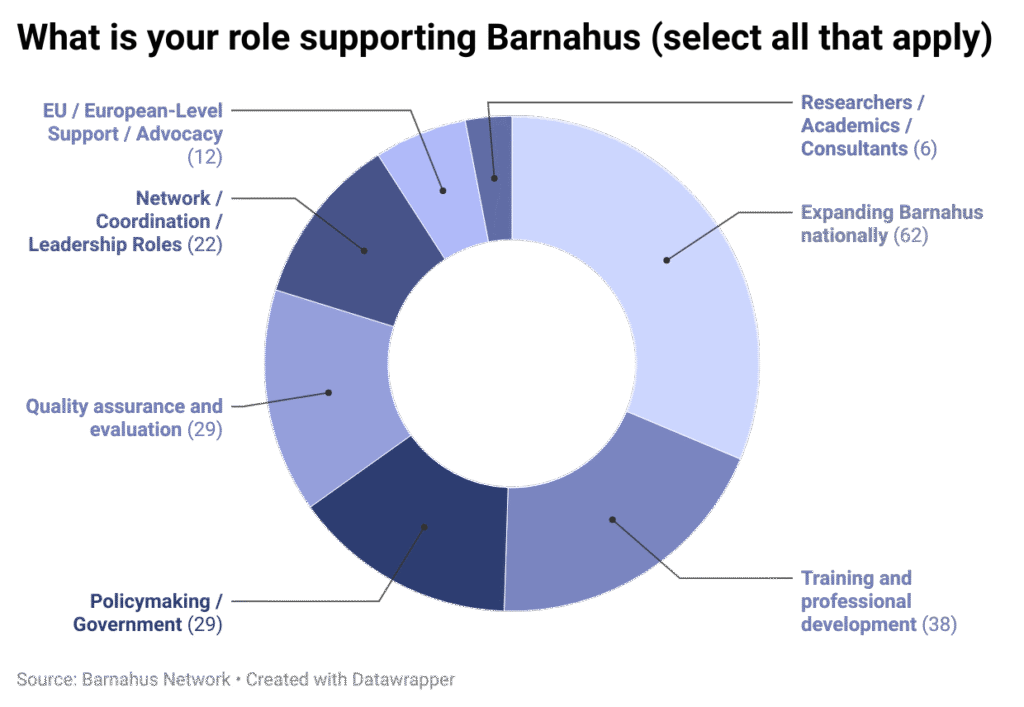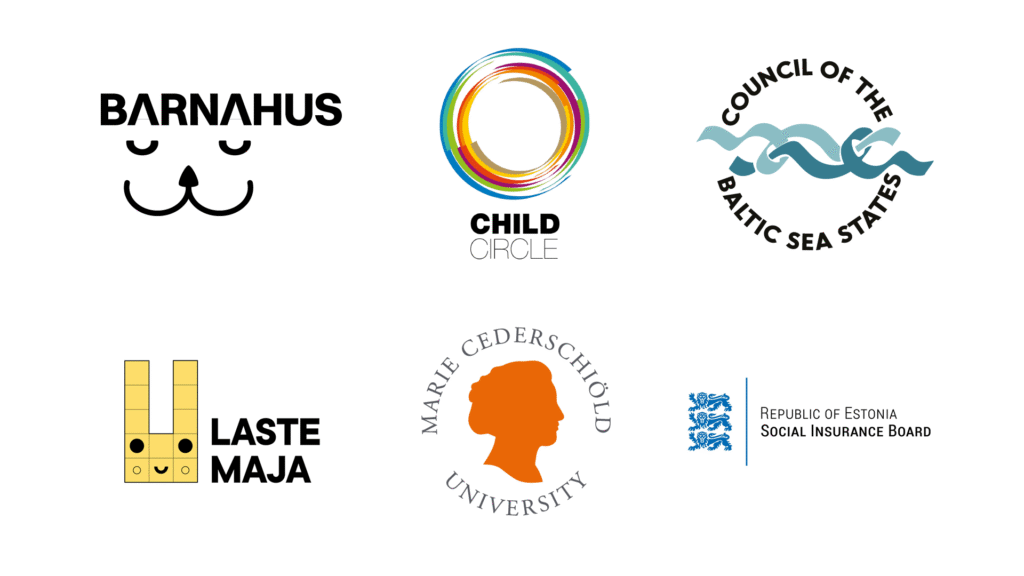Programme
Barnahus Forum 2025
Background information
About the Forum
This event gathers Barnahus practitioners and the community that supports their work in a vibrant exchange of information, tools, contacts, and inspiration that will help participants to keep their momentum going in establishing Barnahus and achieving excellence in practice.
The Forum was last held in December 2022 in Stockholm, Sweden. Here’s what participants had to say about the day:
- It helped me think about how our Barnahus can work more effectively within the constraints of criminal justice system in our country, and still strive to be child focused.
- I was struck by the commonality of challenges and approaches to interdisciplinary and interagency working and found discussions on this topic very useful, with ideas to take back to our setting.
- About the need to address our national challenges with poor police and prosecutor engagement with our Barnahus – this is core to the model and it was good to hear about the impact of more positive engagement and criminal justice outcomes from other countries.
- The Forum helped me to re-focus on the original principles, connecting to the broader purpose and standards.
- I feel much safer knowing there is this network of people, there are people around Europe facing the same challenges, and we are and overcoming them.
By popular demand, we’re happy to announce this year’s forum is longer than last time. We look forward to welcoming you all to experience spring in Tallinn, and to fill your notebooks with pages of new contacts, ideas, and inspiration which can support you to make concrete steps wherever you find yourself on your Barnahus journey.
Overview of the tracks covered by the 2025 Forum
And then what happened …
Picking up where we left off at the 2022 Forum, over the course of plenary and breakout sessions, you can expect to engage on a wide range of practice-based, policy-relevant, and forward-looking discussions. You will hear about practice and progress from diverse Barnahus contexts, and take part in discussions that cut across sectors and roles. These sessions aim to strengthen shared approaches and inspire tailored solutions. They aim to support advances in Barnahus practice, in support of the Barnahus Network’s vision.
From integrating mental health and medical services, to adapting forensic interviews, ensuring access for underserved groups, improving evaluation and accountability, and enhancing child participation—each session is built to inform, provoke thought, and connect professionals working at all levels of implementation. Come ready to contribute, reflect, and shape the future of Barnahus practice.
Track 1 – Advancing Care
This track brings together tools, strategies, and standards to strengthen the care and protection that Barnahus provides. Sessions cover the finalisation of the new standard on child protection, insights on practice and coordination across Europe, and the potential for EMDR therapy to be used more widely in Barnahus settings.
Whether focused on shaping policy or refining clinical practice, these sessions offer participants the chance to examine how Barnahus can deliver holistic, child-centred support that meets the needs of both justice and recovery. This track provides practical inspiration for advancing care across disciplines.
Track 2 – Inclusive Target Groups
This track focuses on how Barnahus can recognise and respond to children whose experiences, needs, or identities may place them at the margins of mainstream practice. Through three sessions, we examine how to tailor Barnahus practice —by adapting communication, addressing bias, rethinking eligibility, and involving key adults in children’s lives.
From children with disabilities, to those harmed online, to those who have displayed harmful sexual behaviour, the sessions reflect on practical, legal, and ethical dimensions of inclusion. Participants will explore promising practices, confront service gaps, and gain tools to expand the reach and relevance of Barnahus for every child who needs it.
Track 3 – Evaluation, Quality, and Impact
How do we know Barnahus is achieving what it promises? This track explores the systems, tools, and shared commitments needed to evaluate Barnahus services meaningfully and to drive continuous improvement. From listening to children’s voices, to reviewing national evaluations, to co-developing a common European evaluation framework—these sessions centre on the question of how we measure what matters.
Participants will examine how to track quality across diverse legal and organisational settings, and how to ensure that evaluations are both rigorous and rooted in children’s rights. This track highlights the shared responsibility of Barnahus teams, governments, and networks to demonstrate the value and integrity of the approach—while remaining responsive to children, families, and the professionals who serve them.
Track 4 – Advancing Investigation
This track focuses on investigations that are evidence-based, rights-compliant, and coordinated with care and protection teams. Sessions will examine how forensic interviews and medical evaluations can be embedded within multidisciplinary teams in ways that enhance both the quality of evidence and the experience of justice for children. Rather than separating investigation from care, this track illustrates how Barnahus brings these functions together – ensuring every child is supported by professionals who are informed, prepared, and working in sync.
Participants will gain tools, insights, and legal framing to help ensure that investigations in Barnahus not only meet judicial standards but support child wellbeing and uphold procedural rights.
About the participants
Participants from 27 countries are expected at the Barnahus Forum 2025 in Tallinn. Delegations include Barnahus teams, ministry representatives, service providers, project partners, and representatives from emerging and established Barnahus across Europe.
Participants span every corner of the model—from forensic interviewers and child protection workers to policymakers, psychologists, prosecutors, and researchers. Many are involved in implementing or scaling Barnahus nationally. Some are just starting out and are here to learn from those further ahead.
The Forum brings together new faces and longstanding members of the Barnahus Network, and offers a platform direct exchange, shared learning, and cross-border collaboration in advancing justice, care, and recovery for children.


What People Are Saying
We asked this year’s participants who they are most looking forward to meeting, and what kinds of conversations they’re hoping to have. Here’s what they told us:
- “Everyone! It’s my first Forum and I want to learn from as many people as possible.”
- “Government representatives who have experience with national implementation.”
- “Other Barnahus leads.”
- “Those involved in the justice process —interview protocols, reducing time to evidence.”
- “Mental health colleagues and those integrating therapy in Barnahus.”
- “Social workers and child protection teams.”
- “Teams from Barnahus Ireland and Scotland—we’re eager to learn from their experiences.”
- “Anyone involved in national evaluations or developing quality assurance.”
- “Medical colleagues supporting holistic assessments and unmet health needs.”
- “Really interested in hearing more about Slovenia’s journey towards legislating Barnahus.”
- “Meeting the Barnahus Network Steering Group Members having only met them online.”
- “I would love to talk about the collaborative work around Standards 2 and 5 — child participation, child-friendly environments, and the best interests of the child.”
- “I have recently been appointed as the Barnahus Manager. We are working to convince our local stakeholders to use it, and seeing increasing its usage. I am eager to meet and to learn from everyone.”
- “I am especially looking forward to speaking to fellow police officers.”
- “Networking with other professionals responsible for supporting MDT collaboration.”
- “I want to hear how others have built trust between law enforcement, justice, and child protection.”
- “I am interested in hearing more about enabling child participation.”
- “Central and Eastern European members of the Network who are operational.”
“As Associate Programmes Director for Ukraine’s Barnahus roll-out, I want to hear how others have built trust between law enforcement, justice and child protection.”
Policies
Preventing Secondary Traumatisation
In recognition of the potential impact of discussing cases of violence against children, we ask participants to adhere to the following principles to prevent secondary traumatisation:
- Relevance and Necessity – When discussing specific cases of violence against children, speakers and participants will limit details strictly to those necessary for learning, reflection, and advancing Barnahus practice.
- Health Warnings – Before presenting or privately discussing potentially disturbing case details, please provide a clear warning to allow colleagues to make an informed decision about their level of engagement.
- Sensitive and Respectful Communication – All discussions will be conducted with sensitivity, ensuring that the dignity and privacy of those involved in real cases are respected. Anonymisation and generalisation is encouraged where possible.
- Mutual support – We encourage open dialogue about secondary trauma prevention and how best each participant can promote it. If you need additional support, please speak with one of the organisers.
By following these principles, we aim to create an environment that is both safe and constructive for all participants.
Child safeguarding
Confidentiality of case information
Please keep all information regarding the identity of any child and the circumstances of any case discussed at the forum confidential.
If presented during any part of the Forum, it is forbidden to take photos or videos of media pertaining to specific cases, for example evidence of physical violence or recordings of example interviews.
In-person or virtual participation of children
In anticipation that children might be present at the conference, participants are expected to read and follow the CBSS child safeguarding policy.
Potential infraction of the policy in connection to the Forum should be notified to the organisers.
Any additional guidance or policies that may be put in place specifically for this event will be sent closer to the date. Participants are expected to read and follow any such documents.
Photos of and with children
With reference to the CBSS Guidance on the use of photos of children, we ask participants to neither take nor post photos of children who are at the event unless given explicit consent. Even with consent, please carefully consider the ethics and risks involved.
Images of children and young people can play an important role in raising awareness of children’s rights and needs. They can empower children and give them a voice. Images can also be powerful tools to communicate violations of children’s rights. They can change how we think about conflicts, disasters, famine, violence against children, homelessness etc. and encourage public support for a call to act. More positively, they can also communicate hope, progress and successful interventions to protect children and help raise much needed funds to advance children’s rights.
However, the use of images of children and young people is increasingly becoming an issue of particular concern in light of the advancement of internet technology, the rapid spread of information online, and the increasing use of social media to share information, images and news.
Privacy policy
Data collected by organisers of the conference will be retained and used for supporting your participation. Additional consent may be asked for other purposes.
Barnahus Network Privacy Policy
Photography
The organisers will be taking photos and videos during the conference.
Sessions in the plenary room may be live streamed.
The organisers reserve right to use the pictures and videos taken during the Conference on social media and/or other communication materials. We are not responsible for individual attendee’s use of your image or likeness.
For any concerns, please contact olivia.lind.haldorsson@cbss.org.
About the organisers
The Forum is co-organised by the Barnahus Network, the Estonian Presidency of the Council of the Baltic Sea States, and the Estonian Barnahus, with the financial support of the Citizens, Equality, Rights and Values programme (CERV) of the European Union.



The above has produced with co-funding from European Union. The contents herein are the sole responsibility of the respective project partnership and can in no way be taken to reflect the views of the European Commission.